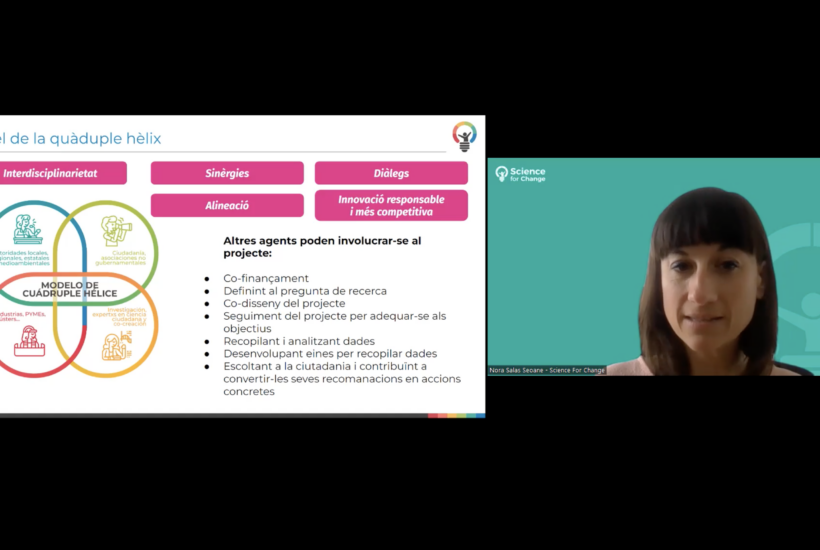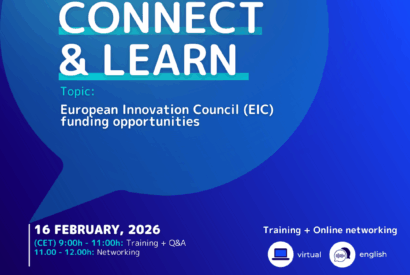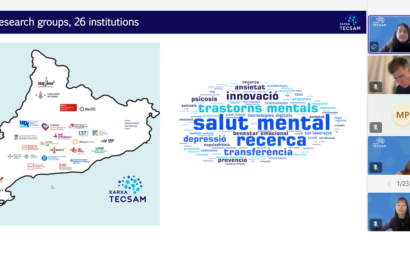Participatory culture, key to starting co-creation projects
Collaborative projects with the first person help to extend and guide research. What are the challenges? We explain them to you!

Participatory research is an opportunity to increase the available knowledge and provide transformative solutions for people
Citizens have relevant, first-person knowledge that is often far from researchers, yet can make a decisive contribution to the applicability of the research.
However, there are still many factors that make first-person participation in research far from optimal: it is necessary to increase the number of participants, guarantee the inclusiveness and representativeness of different social groups, ensure their involvement in all stages of the process and implement strategies to encourage their participation.
These were some of the critical points identified by Nora Salas Seoane, manager of the health area of Science for Change, a company in charge of dynamizing participative sessions with affected people, during the 20th Breakfast & Learn of the TECSAM Network. Watch de session again:
Transformative value of participatory research
The potential of participatory methodologies is enormous. They contribute to research and training and, at the same time, improve the psychological and emotional well-being of participants, empowering them, as well as being a useful resource for informing public policy and improving health services.
However, the participation of affected people is often limited to data collection. According to Salas Seoane, it is important that they can participate as co-researchers: they should be able to be involved in all project activities so that their experience guides the research results and they can make their voice heard throughout the research.
In this sense, during the session, consensus was generated around the idea that in citizen science projects, representativeness is not always a priority, in other words, having samples that reflect all social groups, but rather the transforming value of having the experience and vision of the affected group.
Thus, although the tendency is to move towards greater inclusiveness and more representative samples, the purpose of participatory research is to provide knowledge about a specific problem that affects a specific population group and that contributes to finding solutions for these people. Therefore, not only it can’t be extrapolated, but it is also not its objective.
Involvement of all ecosystem stakeholders
The speaker also pointed out the importance of applying the quadruple helix model in the development of these collaborative projects, which means involving not only citizens and associations with affected people, but also the research community, the Administration and the private sector.
In this sense, it is key to determine which agents are most appropriate to involve in the co-design of the project and to do so from a horizontal and non-hierarchical perspective, understanding that each actor has a relevant role despite being different. Likewise, Salas Seoane has stated that the ultimate goal of these projects should be, as far as possible, to have an impact on public policies, transcending the merely academic sphere.
Another fundamental aspect to encourage the participation of the affected citizens in the research is to create motivational mechanisms. To this end, people should be given access to information, gamification and entertainment strategies should be implemented, and a community should be created to make them feel involved.
Success stories: Transform and Workshop “Mental Health & Women”
During the session, in addition to providing researchers with strategies to introduce participatory methodologies in their research, two successful cases of the application of these methods were presented.
On the one hand, the speaker explained the Transform project, an initiative promoted by the Gynecology Department of the Hospital de Sant Pau and Science for Change to include the vision of women with endometriosis in the project and thus guide research into this disease. On the other hand, the communication responsable of the Network, Iris Mauricio, illustrated the use that has been made of these methodologies in the workshop “Mental Health and Women”, organized by the TECSAM Network in collaboration with Science for Change, and which aimed to know the perspective of women affected by mental disorders about the challenges facing mental health.
Both cases are examples of participatory research and were aimed at co-creating recommendations or solutions together with the affected citizens in order to improve the treatment and quality of life of these people, strengthen social and health services and guide the allocation of resources.
Did you miss the session or do you want to watch it again? Access the recorded video through the following link.

